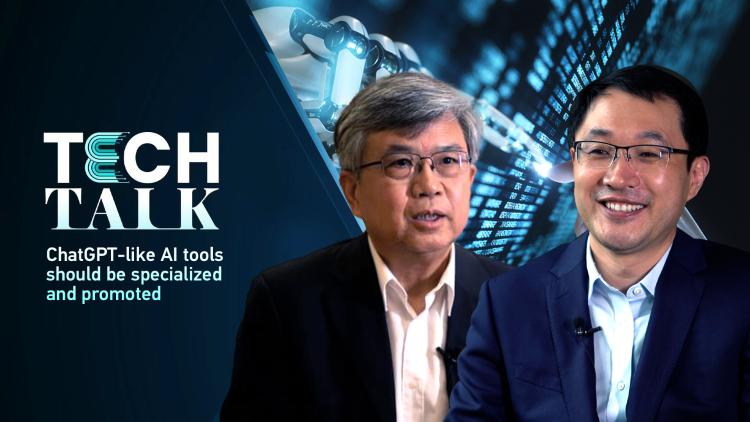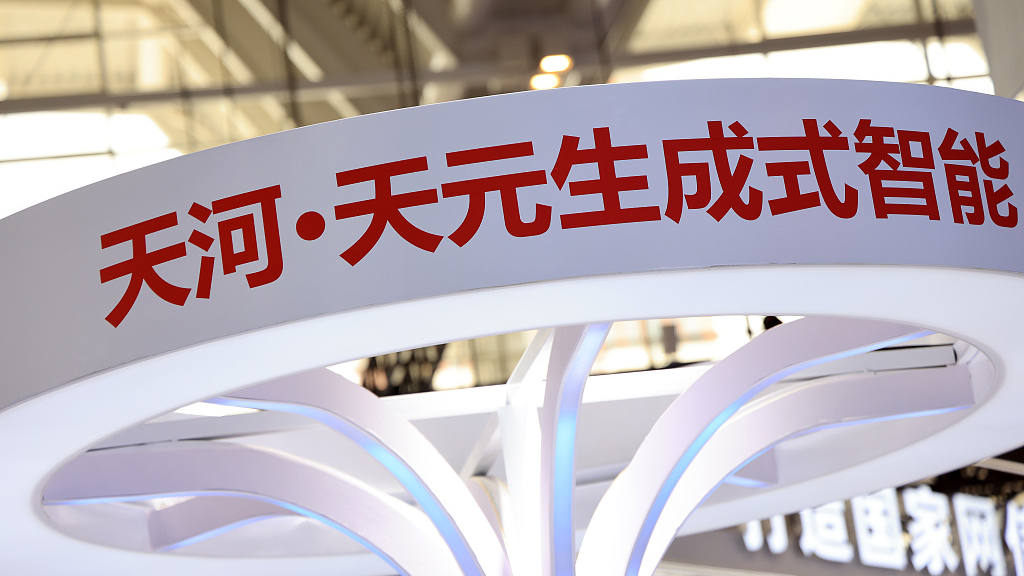04:05

With OpenAI releasing its AI-powered chatbot, ChatGPT, generative AI has ignited a wave of interest in artificial general intelligence.
Based on the GPT (generative pre-trained transformer) language model, the bot generates human-like responses to text inputs in a conversational manner.
The progression of artificial intelligence (AI), from generative to discriminative, is a big step forward, Gong Ke, immediate past president of the World Federation of Engineering Organizations and executive director of the China New Generation Artificial Intelligence Development Strategy Academy, said in an interview with CGTN.
Discriminative AI classifies data into different classes, for example, distinguishing cats and dogs from different types of images. Meanwhile generative AI is capable of generating text, image, video and other types of content based on input data.
From Gong's perspective, generative AI is like a personal computer that pushed this whole new technology into every home, which will be a tool used by everyone.
Companies the world over are currently investing in generative AI. Only in China, several tech giants and speech recognition companies have joined the innovative research and development of this AI technology.
Baidu has deployed ERNIE Bot, Alibaba launched Tongyi Qianwen and iFLYTEK unveiled SparkDesk successively.
On May 19, during the World Intelligence Congress in Tianjin, China's National Supercomputer Center unveiled its own generative AI tool, Tianhe Tianyuan.

The logo of Tianhe Tianyuan model developed by China's National Supercomputer Center during the World Intelligence Congress held in north China's Tianjin, May 20, 2023. /CFP
The logo of Tianhe Tianyuan model developed by China's National Supercomputer Center during the World Intelligence Congress held in north China's Tianjin, May 20, 2023. /CFP
The ChatGPT-like tool it developed emphasized the base of computing power relying on China's autonomous and controllable computing capability, said Meng Xiangfei, chief scientist in Applied Research and Development of the center.
According to the scientist, generative AI requires three basic elements – supercomputing power, big data, and large language model. He told CGTN that most of the country's technological enterprises focused on training large language models, and their computing base may still rely on Nvidia's GPU.
Meng said they have been training their large language model through the collection and sorting of Chinese datasets, based on their new generation of Tianhe supercomputer, which achieves exascale computing capabilities and intelligent computing powers.
"It can solve issues of common scientific calculation for engineering, which still has a strong demand now, and meets the needs of reduced mixed precision computation amid the rapid development of AI," Meng said.
He added that once they tackled difficulties in training large language models with domestic computing bases, the country's large internet companies will be more confident in promoting related research.
"Because we may achieve a complete domestic chain in each link, thus promoting the development of such AI technology," he said.
Why is generative AI so popular?
The base of generative AI, or the foundational large language models, is equivalent to a "super encyclopedia" with a variety of data in network, with which it can communicate and share what it has learnt with people, according to Meng.
"It serves as a super brain of human knowledge and a 'super digital person' that interacts with humans in real time," the scientist said.
Such a powerful base will revolutionize the productive forces and production relations in the future, he said.
Generative AI emerges as a productivity tool because it can be combined with office software to generate text content or medical software to help provide professional advice or with automated production systems to improve production efficiency.
At the same time, as generative AI can interact with people, the relations of production in the future will not only be between humans and humans, but also between humans and machines, the scientist explained.
Is generative AI dangerous?
The "Godfather of AI," Geoffrey Hinton, announced his resignation from Google in early May, speaking out about the dangers of the technology he helped develop.
From Meng's perspective, any risk in AI depends on how human beings, who mastered the technology, would use it.
As the technology is still in a preliminary stage, Meng believed that improvement in laws, ethics and other aspects are needed.
Gong agreed with his remarks, adding that the technology is not perfect. "It is still in the process of developing.”
"It's not surprising if it (the technology) made mistakes, but if you take a single line of it seriously and try to promote it as an authoritative material, it's not its fault, it's your (the users') fault," said Gong, adding that users' literacy and ability should be improved along with it.
The expert stated that although many domestic and foreign enterprises are developing generative AI as a production tool, it's not enough, and such technology should be promoted to resemble a garden where a hundred flowers bloom.
China's efforts in promoting the technology
China has attached importance to the development of artificial general intelligence. It urged the formation of an environment conducive for innovation and on high alert against risks, according to a meeting held on April 28 by the Political Bureau of the Communist Party of China Central Committee.
The country's cyberspace regulator also released a series of draft measures to regulate ChatGPT-like AI services and completed public consultations in May, which are expected to come into effect sometime this year.
According to the draft, the country supports AI's independent innovation, popularization and application, but related products or services should comply with the requirements of laws and regulations, and respect social morality and public order.
Read more: China makes first arrest of man using ChatGPT to fabricate, spread fake news
Gong suggested the government take the lead in developing professional applications and building high-quality and standardized databases, as the country's enterprises each use its own database at present, which would limit its development.
"This way, not only data privacy and security, patents and intellectual property rights would be protected, but the quality of data could also be ensured," he added.
In the current situation, Meng advocated that the society helps cultivate a large number of scientific and technological workers, who would obey relative ethics and morals, by integrating industry and education, adding that only in this way can humans use generative AI for good.
Videographer: Zhao Yuxiang
Video editor: Zhao Yuxiang
Cover image: Yin Yating
Voiceover: Zhao Chenchen